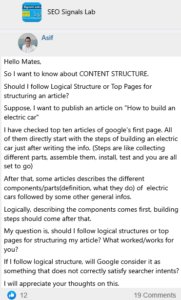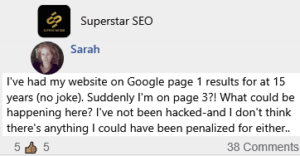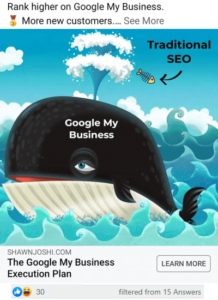Tejas
In the law firm marketing agency, I work in – we don't do link building or link exchange/email outreach.
And for *Onpage SEO* | Search Engine Optimization (SEO) for the website, I have done the thing listed below:
SEO-friendly URL
Title
Description
Heading tag optimization
Keyword Optimization/Content Optimization
Image Optimization
Internal linking
Robots.txt file checking
Sitemap (xml and html) implementation
Schema Markup
Yext citation building (for law firms)
My question is – What else I should do to get it more traffic and rankings. Please help.
P.s. We also do some "community involvement/outreach" (like giveaways).
18 👍🏽 18
[filtered from 29 Answers]
What have you actually marked up when you say "Schema Markup" – have you actually marked up the
https://schema.org/LegalService pages? (PRO TIP: When Google talks about schema they support, they are referring to schema they support that generates rich snippets of some sort. It does NOT mean that anything they don't support has no value – it still helps them understand exactly what you're talking about.)How about the total site structure and how all the information is connected? That's probably the most important thing of all when it comes down to it.
SCHEMA.ORG
LegalService – Schema.org Type
Thanks for the reply, but I already did legal schema implementation for all of our clients. Anything else you can think of?
Joshua
topic clustering works especially for low volume, which is what most legal are doing. Really you should be focusing on the Google My Business (GMB) right? And then using the web site as hardcore lead gen.
Yes- We do focus on GMB and our client's sites ranked well in local map packs.
Joshua
I don't know what your data shows you but I can't imagine that much traffic is coming off organic, unless it's very niche, long-tail. That was my experience when I had a couple legal customers. Use case is that people click website in the map pack and then evaluate for trust, experience and capabilities. It's a big investment and there's a lot on the line for the client. Usually.
Tejas » Joshua
I agree
Joshua » Tejas
So, you already know what to do! Big GMB boost is getting reviews from the zip codes you want to rank in. Obvious but often overlooked. Huge, huge boost. Incentivize the reviews and focus on the areas where you want to rank.
Tejas » Joshua
Yes- for many of our client's we have around 150-250 reviews per listing.
Joshua
Target them to where the clients might be. Lots of high dollar divorces in certain zip codes.
Jason
I worked on attorney sites for the last 6 years. Ranking organically in a major metro without link building is a tall order.
For clients that couldn't afford link building we wrote information content and top of funnel content:
"How to read a car accident report in "state"
"Can I file for divorce if my spouse is missing?"
"Can I move out of state and still have child custody?"
Yes – We too do lots of blogging/content marketing (longer-form content).
Kathy » Jason
That worked for me for a PI attorney in a very large metro area. No one believes me when I say I got him to the 1st page with no link building, but I did. Client got over confident and paused the Search Engine Optimization (SEO). Guess what happened? He dropped to #15. That finally shook him up. We're going to start blogging again. I'm going to try and get him to middle of page 1 with no link building. If you do the same, I'd love to share experiences and ideas with you, assuming you're not in the same vertical and metro area. 😉
Biron
1 – So far you've checked off a lot of the best practices so keep up the good work. I don't agree with others that you should be "link building", if you're talking about guest posting etc or getting some backlinks for the sake of backlinks.
2 – Legal websites are considered a YMYL (your money, your life) industry and will be under higher scrutiny for E-A-T (expertise authority and trust, if you haven't heard of it). Google doesn't have an algorithm that directly ranks based on this but they do look for signals of this and train their algorithms on detecting it via the Quality Search Raters guidelines.
On E-A-T there isn't a list of specific optimizations but I would look into the info on how Google tried to evaluate this, in order to know how to demonstrate this on your site. It sounds like you're already creating good content so it shouldn't be hard to demonstrate it on the website. Check out Slawski's patents on the subject to get an idea of how Googles algo's work surrounding this, and also read Marie Haynes blog for an intro to EAT.
My suggestions would be, for starters, create an about page on your site and link to it in the nav menu or footer. Be transparent about your business' mission and values, work that you have done to service clients in the past, other credentials, and detailed info about your staff. Add contact info to the site if you haven't already.
Display author info on your articles clearly for users to see. People trust info written by real people. I suggest putting author name (and photo if you have space) and a link to a more detailed author page with info on the person's background, expertise, and possibly contact/social info if they are comfortable with that. Add Person schema to author pages and be sure to check out all available properties on schema.org, not just what's available in Google's search gallery – as someone else has mentioned, those are mainly used for generating rich snippets but many unsupported schema types can still be ingested by Google's knowledge graph algo's to better understand these entities.
If you do comprehensive research for your articles or use references of legal texts etc, add those citations as in-content links or at the bottom of the article (like Wikipedia). This is helpful for Google to gauge your expertise and also allows users to trust your advice. If you write about anything without a consensus it's good to reflect all sides of the topic in the article too.
Use social media's or other relevant platforms to get your business out there. In my experience if you have a fair business and helpful service, then being transparent about it will help acquire clients when they are in need of such a service. And Google will notice these signals and reward you accordingly. Also there is a form of """link building""" that does work and is natural, which involves getting real testimonials, reviews, or recommendations rather than a backlink for the sake of it that may be irrelevant or reciprocal in a way that Google considers "unnatural". E.g., if there's a local newspaper or yellow pages type of service reach out and see if you can put out a listing about your service. If your city has a blog or directory of local services ask if they can add a link to you. There is a difference between unnatural link building and putting your service out there for people to find. Also know that Google now understands mentions even without links in many cases so a backlink isn't the be-all, end-all anymore.
You can also engage with your local community through comments, FAQ's, and Q&A's. You do giveaways so I'd definitely showcase that on the website. Consider starting a newsletter – most people use Gmail and we know Google sees this data, probably don't use it in rankings but there is a feature in personalized search that recommends relevant articles to logged-in users from their email which can capture more local clients when they need your services.
If you have a blog make sure you also structure it in a way that makes the info easily accessible by users and Google. This includes but isn't limited to:
– well-working site search, you could use Google's Custom Search Engine API for one
– logical categories/tags/landing pages to organize different buckets of info
– most relevant landing pages in your nav menu
– if you have long articles, consider adding ToC in a sidebar or a jump links menu. Wikipedia is a good site to model off of
If your users are primarily mobile, make sure to use a mobile design that has a positive user experience. (Responsive is my suggestion but not necessary. Info is not missing on mobile compared to desktop, menus and important pages are easy to access. And of course, good Core Web Vitals)
Hope that gives you some ideas! Good luck.
This may satisfy you: An SEO Opinion: Schema Is Useless; Nothing; Pure Bloat





